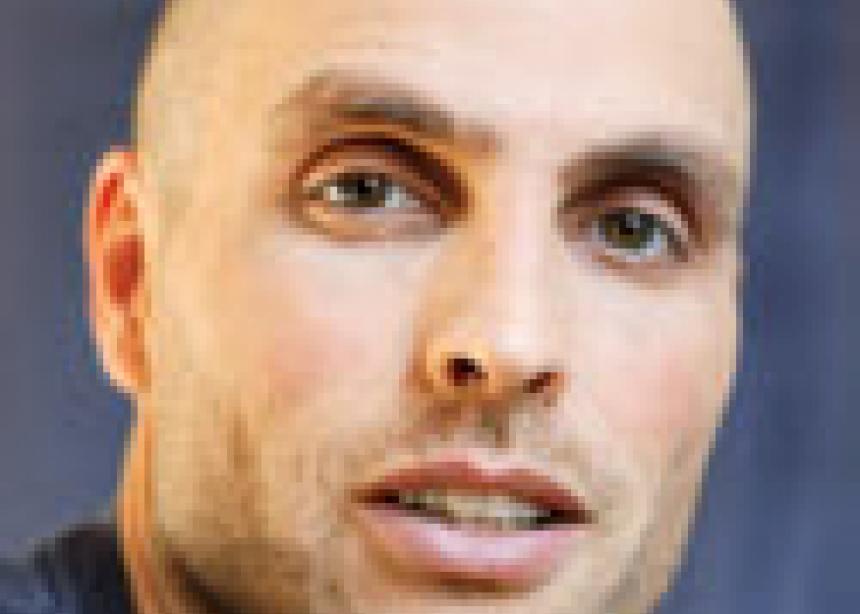America is again ablaze with partisan divisiveness. As two men square off to be king of the biggest castle on earth, I am both captivated and disturbed by the crescendo of polarization.
For Christians, the religiously charged U.S. election campaign raises an obvious question: what role should church play in the battle zone?
“To bring truth,” says Gus Booth. He is the pastor of a nondenominational church in Warroad, Minnesota, 10 kilometres south of the Manitoba border. Booth does not shy away from battle. Speaking by phone from his office at Warroad Community Church, he says in relation to the upcoming election that just because something is polarizing doesn’t mean Christians should “crawl in a little hole and keep truth to ourselves.”
Booth suggests that Jesus was “one of the most polarizing figures in history.” His tough talk contrasts with his free-flowing, small-town congeniality. His tone is more that of a friendly neighbour than moral warrior. But in 2008 he became the first minister in U.S. history to pick a fight with the Internal Revenue Service (IRS) over the Johnston Amendment, a 58-year-old piece of legislation that says entities exempt from federal income tax cannot participate or intervene in a political campaign. That means churches jeopardize their charitable tax-exempt status if they endorse or oppose specific candidates for public office.
During the 2008 Democratic primaries, Booth critiqued Hillary Clinton and Barack Obama from the pulpit. Later that year, he called on his parishioners to vote for Republican John McCain. He sent both sermons to the IRS in the hopes that it would provoke a legal battle that would ultimately clarify the lines between government jurisdiction and the pulpit. The IRS took the bait, but later dropped the investigation, to Booth’s dismay, due to unspecified “internal procedural issues.”
I wanted to talk to Booth because I believe in trying to understand people who have a different take on truth. The trap of polarization is to yell louder, to argue more vehemently, to demonize and defeat the other side. But the only real winner of that battle is divisiveness itself.
I don’t like the negative sentiments the U.S. election campaigns evoke in me. I don’t like it that the messaging is designed to fuel disdain and deepen divisions. I knew speaking with Pastor Booth—who I had interviewed before—would have the opposite effect.
The only way I can see to turn down the heat of polarization is to reach out to people of differing views in an honest attempt to understand. I don’t share Booth’s views on the “socialistic” nature of Obamacare, but genuine human interaction tends to blur the lines that divide. Plus, he’s the kind of person who’s hard not to like. Instead of arguing with him, I asked him what he would say to a room full of liberal Christians?
“I don’t hate you. I don’t hate homosexuals. I don’t hate abortionists.” He speaks emphatically, pleadingly. He says conservative Christians get “labelled” very quickly as “hateful bigots.” This pains him. While he acknowledges that there are “railing” Christians who speak with anger, Booth says his views on certain issues simply do not equate hate. He emphasizes that truth must be spoken humbly and lovingly, as Jesus exemplified.
Though Booth believes in fighting for truth and says divisiveness is “a fact of life,” he still sees some value in conversations across lines of division within the church.
“We need to be able to love each other in spite of our differences,” he says. “My own secretary is a very liberal Christian who doesn’t even attend church here,” he adds, “and I respect her.”
On Oct. 7, Booth will again urge his parishioners to vote Republican and he will send his sermon to the IRS. Over a thousand other American preachers are expected to do the same thing on that day, which is designated as Pulpit Freedom Sunday, an initiative endorsed by James Dobson.
Speaking with Booth didn’t change my political views, but it gave me a respectful understanding of him and it reminded me of a simple fact: we are all on this earth together. We need to find healthy ways to be together. A recent op-ed in The New York Times said both Democrats and Republicans succumb to the impossible notion that the other side will somehow disappear altogether if they lose the election—that winning the battle will preclude the hard work of collaborating across differences.
As Christians we also need to resist the temptation to overlook the essential togetherness of humans. Instead of looking down on others or looking away from them, we need to do the hard, humble work of creating a Church in which there is neither Jew nor Greek, slave nor free, liberal nor conservative.




Comments
Great article brutha!
Add new comment
Canadian Mennonite invites comments and encourages constructive discussion about our content. Actual full names (first and last) are required. Comments are moderated and may be edited. They will not appear online until approved and will be posted during business hours. Some comments may be reproduced in print.